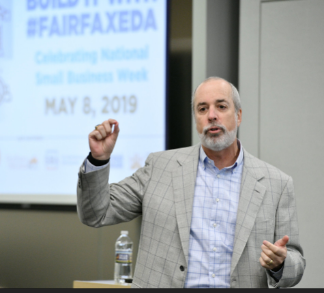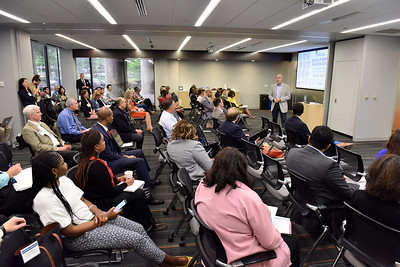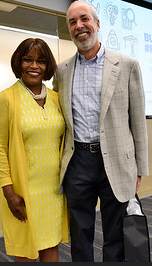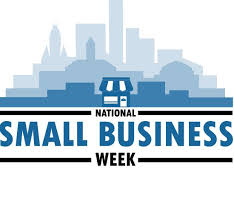E-Newsletter
Financial planner, author Ric Edelman focuses on opportunity at FCEDA workshop for small business
Last week, in celebration of National Small Business Week, the FCEDA hosted a half-day workshop, Build It With #FairfaxEDA, which featured small-business experts to inform and encourage those with — or planning to start — businesses of their own in Fairfax County.
| Financial expert Ric Edelman explains why Fairfax County is a great place to grow a business in an interview with E-Bird Extra. |
Nationally recognized and award-winning financial planner Ric Edelman keynoted the event. He launched Edelman Financial Services (now Edelman Financial Engines) in Fairfax County and has grown it to 180 locations and about 1,400 employees across the nation.
E-Bird Extra had the opportunity to speak with Edelman about changing trends, traps business owners encounter in financial planning, and why Fairfax County is still the ideal place to be for businesses of all sizes.
E-Bird Extra: Today’s crowd includes many sole proprietors, small business owners and entrepreneurs. What is your message to them?
Ric Edelman: Talking to a group of entrepreneurs, my primary message is this: Opportunity has never been greater. We have lower barriers to entry than at any time in my professional career, which now spans over three decades. The economic opportunities, the technological opportunities that exist that make it cheaper and easier to start a business and run a business have never been greater. As a result of all this, I would strongly encourage folks to look closely at the entrepreneurial opportunities that exist.
 |
|
|
Ric Edelman gets his point across at the FCEDA’s Build It With #FairfaxEDA event, part of Small Business Week. (Photos, FCEDA)
|
EE: You started your highly successful business and made your mark in Fairfax County. What makes this such a good place for businesses of all sizes?
strong>RE: (My wife) Jean and I were very lucky. By sheer happenstance we found ourselves in Fairfax County in the 1980s. We went to college in New Jersey and came here to the D.C. area because of politics. I was working for a congressman. That didn’t last very long, but we loved the area and stayed. We began our financial planning practice in 1986. We didn’t realize it at the time, but Fairfax County is probably the best place to build a business anywhere in the country. The D.C. region as a whole is the number one economic region in the country and we have been beneficiaries of the success of this region. There is no better place to start a business and build a business.
> Click here for a recap of FCEDA’s Build It With #FairfaxEDA’s Small Business Week event.
We have the highest average college graduation rate, per capita, in the United States. We have the highest number of grad students, per capita. We have more doctors and more lawyers, per capita, than anywhere in the country — more Ph.Ds, per capita, than anywhere else in the country. We have a huge biotech sector, a huge telecom sector. Of course, the defense industry is here and we have the federal government as well. We are largely recession proof because of the tourism and government operations that we have here. Having three airports doesn’t hurt. There aren’t too many places in the country that can brag about three airports. And we’re a couple hours from the mountains and a couple hours away from the ocean with a temperate climate that is largely resistant to hurricanes, tornadoes, floods and earthquakes.
This is a pretty exciting place to live and to build and to grow a business … If you could pick pretty much anywhere in the country where you wanted to start a business, I would have to argue that Northern Virginia and, in particular Fairfax County, is probably the place to be.
 |
EE: Obviously, no one size fits all when it comes to financial planning, but is there a common mistake that small business owners too often make?
RE: There are two mistakes that small business owners make when it comes to financial planning. The first is…to focus entirely on their small business. It makes sense and it’s great to see that people are focusing on that. But recognize that running your business is only part of the equation. You equally need to focus energies on your personal life, not just your business life. Second, recognize that the very attributes that make your small business successful are the opposite of the way you must behave with personal financial planning. This trips up an awful lot of entrepreneurs and causes them to make rally bad mistakes on their personal finances.
I’ll give you a couple of quick illustrations. In business you’ve got to be agile. You’ve got to be able to be responsive to competition, to technology, to regulation, to consumer demands. You have to constantly change and update your business so that it remains viable. That’s the exact opposite approach that you need take with personal finances. With personal finance, you don’t want to be agile with your investments. You want to, instead, hold onto your investments for very long periods of time.
Also, in your business you need to be highly concentrated. You need to focus all of your energy, all of your time, all of your money on your business if you’re going to succeed … That high concentration is the exact opposite approach that you want to take on a personal finance basis. You want to diversify your investments. You don’t want to put all your eggs in one basket. You want to own a wide array of asset classes. In other words, the strategies you use to be successful as a business owner will spell problems for you in the personal finance world.
 |
|
|
Edelman and other speakers drew more than 70 small business leaders to FCEDA headquarters in Tysons for Build It With #FairfaxEDA. |
EE: From early on, you have obviously made the most of media opportunities. How did you determine the best way to get your message out?
RE: Most build their businesses based on referrals, and that’s an OK way to do it. It’s certainly free to ask folks for referrals. But it’s also slow, because it’s a one-by-one-by-one scenario. A more effective approach is the mass media and that’s how we built our business. We founded our company 33 years ago on financial education and our goal was to get this information, this content, this knowledge, out to as many people as possible as quickly as possible. It’s much more effective to do it in a seminar where there are 30 people or to do it on a radio show where there are 100,000 (listeners) or do this on a TV platform or to do it in a book or to do it on the web. That’s why we’ve mastered, over the years, all marketing channels — all forms of mass communication.
EE: How is new media changing things and how would that change the approach of a business today?
RE: It’s getting even bigger than it was when I first started. Back in the day we had three television networks plus PBS. Today there are hundreds of cable channels. Today anybody can publish a book, whereas when I first started you had to go through the gatekeepers of major publishing houses. It was very difficult to be able to host a radio show because you had to be accepted and approved by the powers that be — and there aren’t many radio stations in any given market.
Today, anybody can create a podcast and toss it up on to the web. Anybody can produce a video and toss it onto YouTube. So, the barriers of entry have become much lower. It’s become much easier to create content and distribute content.
That’s the good news. The bad news is there’s a lot of noise out there because we’re posting more videos on a daily basis than you’ll ever be able to watch in an entire lifetime. So you have to champion the channels that you want to have success in and, more importantly, you need to champion the audience that you want to reach. I would not, if I were starting out today, seek to champion mass media and broadcasting. I would, instead, choose “narrowcasting,” meaning instead of going on radio or television and talking to everybody, I would choose the specific audience I was trying to reach and go to where they are — whether that’s print, whether that’s broadcast, whether that’s digital. There are places where the people you’re trying to reach congregate. Find out where they are and go there and penetrate very deeply.
 |
|
| Karen Smaw, the FCEDA director of business diversity, invited Edelman to deliver the keynote address. |
EE: You’ve been kind enough to provide one of your books to each of our attendees today. What would be an important takeaway or two from that book?
RE: That there’s a huge amount of opportunity. You just need to make sure you’re on the cutting edge and not acting as a dinosaur.
[The book is my] New York Times bestseller The Truth About Your Future. What most folks don’t realize is that exponential technologies are changing virtually every aspect of life on our planet: robotics, artificial intelligence, machine learning, nanotechnology, biotech, bioinformation, neuroscience, 3D printing, blockchain and digital assets — all of these new technologies, incredibly disruptive technologies, are changing virtually every aspect of commerce in America. They’re affecting every aspect of financial planning, from college planning to career planning to retirement planning and, of course, investment management.
It’s vital that business owners and entrepreneurs are aware of these technologies because they are going to eliminate entire industries. They’re [also] going to create brand new industries. It’s very important to be aware of … the impact they’re going to have on society so that you’re not building a business that turns out to be a buggy-maker in the world of the Model T.
 |
EE: Can you talk about the pride you feel when you see one of your clients — perhaps one with a small business — attain or surpass their goals?
RE: The only thing that gets us really excited in our firm is watching the success in our clients. We’ve achieved a certain amount of success in our company and that’s fine. That’s gratifying. But what really matters is watching the personal fulfillment of our employees and watching them grow and develop in their progression and watching our clients achieve their financial goals. [It’s about] watching our clients be able to send their children to college; be able to retire and maintain the lifestyle that they want; for them to be able to care for aging parents. Being able to make a material, positive impact in people’s lives, one at a time — that’s why Jean and I created our firm 33 years ago and that’s what’s keeps us motivated every day.
News Travels Fast
Stay ahead of the curve with the latest business news from Northern Virginia. Receive updates on moves, incentives, workforce, events and more.
